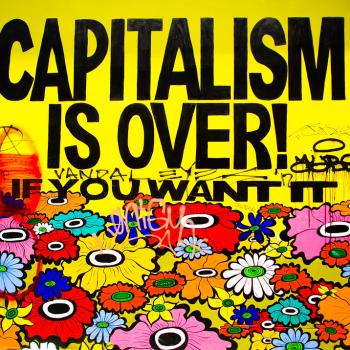BAILOUT, n. First known use: Noah. Novel regressive taxation scheme whereby vast sums of capital are transferred from those citizens who didn’t participate in the illusory Bacchanalia of the housing bubble to those who did and weren’t clever enough to get out in time.
CREDIT-DEFAULT SWAP, n. loose translation from the original Latin “ubi mel ibi apes,” or “where there’s honey there are bees.” 1. A complex financial instrument vital to the functioning of a modern economy in the way it spreads risk among consenting parties. (Greenspan, A., pre-Sept. 2008.) 2. A complex financial instrument that nearly destroyed modern capitalism (Greenspan, A., post-Sept. 2008).
CREDIT LINE, n. A set amount of borrowed money available only to those who don’t need it.
DEFICIT, n. For the party in power, at worst a minor irritant and at best a precondition for economic growth. For the minority, the gravest threat to the stability of the Republic.
FEEDBACK LOOP, n. Process by which the significance of an event is amplified by constant repetition. Orig: CNBC. See ADVERSE FEEDBACK LOOP.
LIGHT TOUCH, n., obsolete. Theory of regulation in which financial companies recycle profits to lawmakers as campaign contributions, prompting them to relax the rules until the banks inevitably mess it up, at which point the dominant theory switches to “heavy hand,” prompting years of economic contraction and the cycle to repeat.
PPIP, or PUBLIC-PRIVATE INVESTMENT PARTNERSHIP, v.t. Orig: Gladys Knight. To use a form of hypnotism in which merely saying you intend to fix a problem has the effect of making everyone forget about the problem. Usage: “We really peepipped Congress on those AIG bonuses.” See ASSETS, TOXIC.
QUANTITATIVE EASING, n. A regulatory approach based on the point in Western movies when the sheriff, having fired all available bullets, in an act of final desperation throws his gun at the bad guys. See also INFLATION, HYPER.
SECURED CREDITORS, n. In modern American capitalism, the parties last in line for repayment after a company’s failure. The others in line include the government, unions, sundry suppliers, friends of the union, friends of the government, unsecured creditors and people vaguely familiar with the matter.
TARP, n. acronym. 1. A synthetic device designed to cover up an unsightly mess, or to protect perishable goods (firewood, banks) from the ravages of the elements, typically costing somewhere between $12.99 and $700 billion. 2. Prime example of how governments use otherwise anodyne acronyms, abbreviations and sports metaphors to disguise matters of controversy. See also TALF, TLGP, TURF, FHFA, BACKSTOP, WRAP, OFHEO and SPECTRE.
TOO BIG TO FAIL, idiom. Banks, insurance companies, car companies, presidential approval ratings, Fed chairmen seeking second terms, other people who think they should be Fed chairman, the reputations of people who’d be responsible for letting things fail. Antonym: TOO BORING TO SAVE.
TOXIC ASSETS, n. 1. A collection of bad loans and other botched financial bets that caused big losses for banks, prompted a credit crunch and sank the economy (Sept. 2008 to May 2009). 2. Long-term investments that will pay handsomely when the housing market recovers (June 2009 onward).
HT: a href=”http://pagantolutheran.blogspot.com/2009/09/with-apologies-to-ambrose-bearce.html”>Bruce Gee












